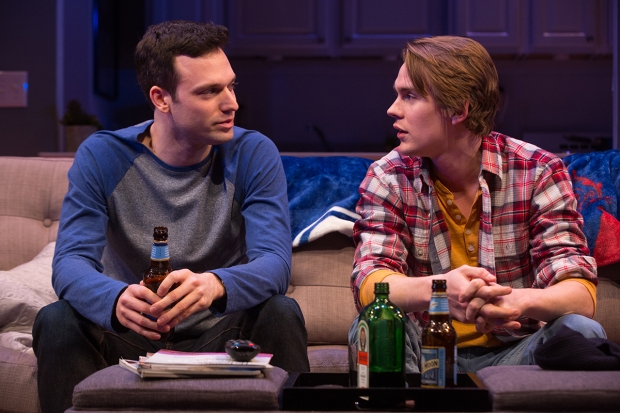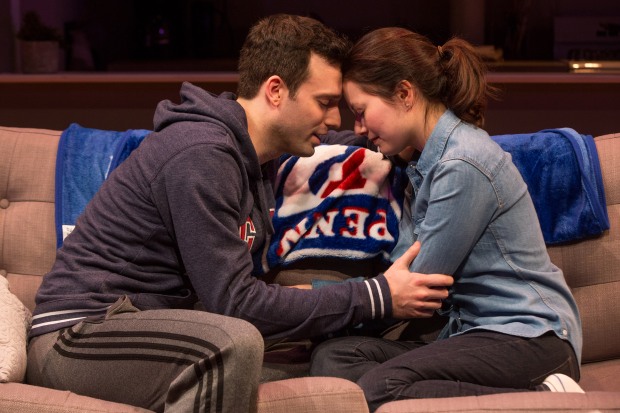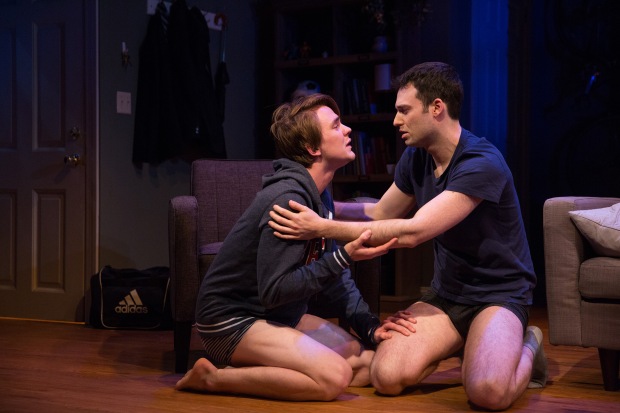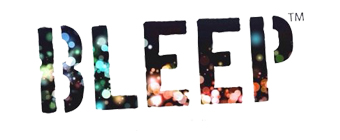What’s in a label? We talk with the cast of the Off-Broadway hit Straight
Straight, the new play running Off-Broadway at Theatre Row brings together Jake Epstein, Jenna Gavigan and Thomas E. Sullivan to tell the story of Ben, a young investment banker, and his complex relationships with both Emily and Chris. This modern, of-the-moment, play has audiences considering how important labels have become in our society. We talked with the show’s trio of stars to talk about acting, putting together a new show, and how Straight speaks to current social climate in America.

When did acting become something you were going to do as a career and not just a hobby?
Thomas: I was in school and one of the first things I ever got to do was take a play to competition festival. I realized you could win and that I could be a competitive person. For me, one thing led to another and I found that it was a trade I could work on and be fulfilled by for a lifetime.
Jenna: I started auditioning professionally at age 11 so I think I always thought of it as a career. I started consistently making money at 15 so for a good chunk of my life, it’s never left my mind. I have my degree in writing, but acting has always been who’ve been. My first Equity gig was an early reading of Spring Awakening, in the summer of 2000.
Jake: I still think of it as a bit of a hobby to be honest. I made the decision to go to theatre school after I did Degrassi. I gave myself two years to try the stage thing out and then I booked some jobs. So I gave myself three more years and it’s been going like that ever since.
Jake, you spent six seasons on Degrassi: The Next Generation. How have you taken what you learned from your time on the show and applied it to your craft on stage?
Jake: On Degrassi, what was so special was that the issues were so real and genuine to what is actually happening in high school. The show prided itself in not talking down to teenagers and had the respect of telling it like it is. Because of that, I have sought out projects that have something real to say.
Jenna, you and Jake have both spent time on the Broadway stage. Has there been a certain moment in your career so far where you thought, wow, this is what I’m meant to be doing?
Jenna: I had been up for a lot of Broadway shows as a kid and I made my Broadway debut at 16 in Gypsy. I remember thinking I couldn’t possibly imagine being happier than I was then. It was so fulfilling and everything I wanted Broadway to be. I’ve also had moments at auditions, even for jobs I didn’t get, where I felt like I nailed it and left knowing I loved what I do for a living. Auditioning isn’t fun. It’s stressful and it’s a wacky setup, but you have auditions that go well and you feel respected for what you’re doing, it’s incredibly fulfilling.
Every actor appreciates a certain part of the process of putting a show up more than other parts. What is that for you?
Jenna: Because this is a new play, we got to sit down and talk about it for a few days, which was great. We were able to discuss it and unpack it because it was just the three of us. I love being in a rehearsal hall, but once we got on our feet and were on the stage, there’s a real magic there. Once you’re wearing the costumes and, for example, having a real refrigerator to open rather than a placeholder in rehearsal, something clicks.
Thomas: I’ve always enjoyed the performance aspect. I love rehearsal and discovering new things about the piece, but to a degree, some of that goes out the window when there’s an audience there. When you have other people looking at it, it changes. I love performance and the technical rehearsals when you see everything come together in a literal way.
Jake: I love when you just start to get audiences. It’s that period where you’ve rehearsed it for a long time and it’s so new and fresh and real. You don’t know where the laughs are coming and what’s going to be resonant with a live audience. There’s a purity in figuring it out and that’s pretty special.

How has this role in Straight challenged you as an actor?
Jake: Straight has challenged me in a few ways. I’m on stage practically the entire show so there’s a stamina I’ve had to rely on. Learning to keep the energy up every night has been something else. I’m playing a guy who is in a five-year relationship with his girlfriend, and has feelings for men. But, he doesn’t want to be labeled as a “gay man” by society. It’s a complicated relationship between the girlfriend and the young man he meets. I think the challenge is that despite the fact that he’s cheating on his girlfriend, we still need to go on this journey, not hate him and understand his struggle. Luckily the writers have done a great job of making his dilemma understandable.
Thomas: I’ve been very fortunate in that it’s very much of today. The themes of the play have to do with stepping outside of a label. It isn’t too difficult to become this character I think. In a more pragmatic way, it’s my first Equity job and having to be at a 9-to-5 occupation has been thrilling yet challenging because it’s a new phase of my career and my life. It’s been a blast.
Jenna: It’s the dreamiest experience. There are only three of us on stage and I’m certainly used to jobs with far more people in the cast. I’m also the only woman surrounded by boys. It’s a relationship play. I play a scientist so it’s about respecting who this person is. I think she has been based somewhat in reality because one of our writers comes from a scientific family. I’m making sure I respect that this is a scientist who really lives for her work. I also feel a responsibility to Jake and Tom. I need to give them what they need on stage since it’s only us on stage together. I need to be on my game so they can be on their game and that makes it really fun.
Jenna, you mentioned the relationship aspect of the play?
Jenna: It’s wonderful that different sexual orientations are accepted more, but sometimes I hear that when someone says they are bi, they must be gay. Kinsey said people could like both genders 55 years ago and people still don’t get it. That’s what Ben is struggling with in this play. He’s got feelings for a guy and girl, yet people think you can’t like both. Being in show business all my life, I’ve never thought about it really because I’ve always been surrounded by so many diverse people. But I’ve had friends who struggled with coming out and whose families still had a hard time with it. People still feel like they won’t be accepted.

On that topic, how do you feel like the subject of the play reflects today’s culture?
Jenna: My character, Emily, is getting her PhD at Harvard and can’t pay her cell phone bill. She’s literally curing cancer and can’t pay the bills. I have friends who are married and have good jobs but are so financially far from owning a home one day because of school loans. Our generation isn’t where our parents were at the same age. This touches on why education is so expensive.
Thomas: I find that a lot of what this play has to say is in regards to a post-acceptance America, a sort of liberal tolerance of today. While that’s great and strides have been made, there are still pitfalls that forward thinking people can fall into today.
Jake: It’s a really unusual coming out story in that it’s not a guy who is afraid of coming out. He’s afraid of being known as a gay man. He has nothing to do with gay culture, he likes beer and sports and joking about girls, but he happens to like men too. The play questions why gay people have to tell people they’re gay, whereas straight people don’t have to tell you they’re straight. In a society that’s accepting of gay people, it goes a step past that acceptance and asks the next question.
Check out Straight at Theatre Row in NYC through May 8.



You must be logged in to post a comment.